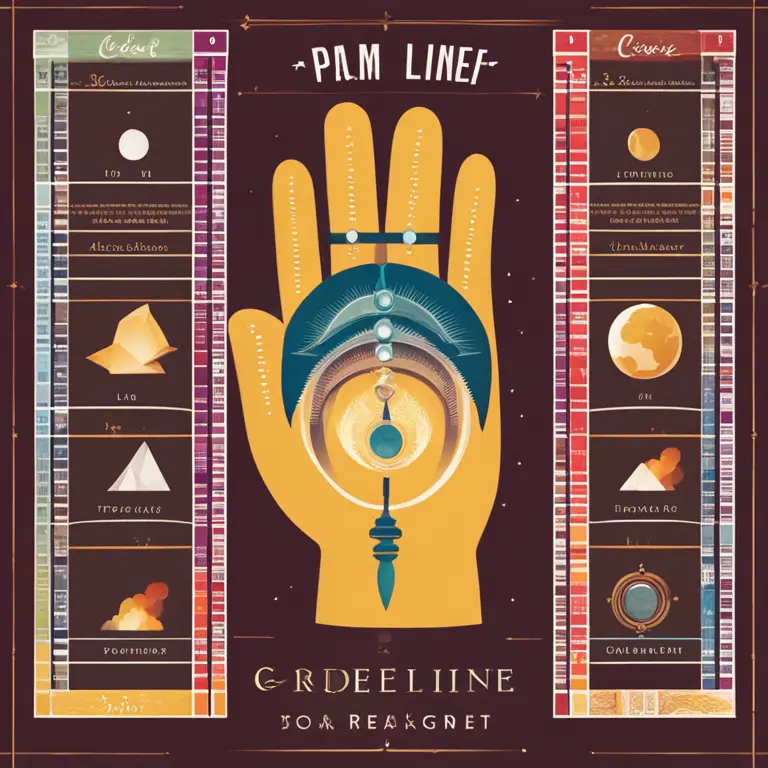
Mastering Palmistry: Life Line Interpretation Guide
Discover the intricacies of palm reading with our concise guide to interpreting the life line, a key element in palmistry.
article by Nora Pennington
An Introduction to the Life Line
In the ancient practice of palmistry, the life line is one of the most significant and often discussed lines on an individual's hand. Contrary to popular belief, the life line does not determine the length of a person's life but instead reflects their vitality, general well-being, and significant life changes. The line originates between the thumb and the index finger and arcs down encircling the thumb ball toward the wrist. Understanding its depth, length, and curvature can offer insights into a person's life journey.

Starting Points and Implications
The origin point of the life line can hold great meaning. If the line starts joined with the head line, it suggests a cautious and thoughtful approach to life, often indicating a strong will. In contrast, a life line that begins independently denotes a more adventurous spirit, with a propensity for restlessness or spontaneity. Observing where the life line starts can provide a clue into the individual's early years and inherent nature.

Depth and Quality of the Line
A deep and well-defined life line signifies a robust and energetic existence. Individuals with such lines typically enjoy better health and resilience. On the other hand, a shallow or broken life line might indicate fatigue or potential health challenges that require attention. The line's quality—whether it is clear or blurred—also contributes to the overall analysis, potentially reflecting the individual's level of vitality at different stages of life.

Length and Curvature Analysis
The length of the life line also provides valuable information, though it should not be used to predict lifespan. A long and curving line signifies abundant energy and enthusiasm for life. Conversely, a short life line may indicate a need for conservation of energy, rather than a short life. Importantly, the curvature itself relates to a person's approach to life experiences, such as their sociability and willingness to embark on life's adventures.
Interpreting Breaks and Chaining
Breaks in the life line can suggest transitions or life-altering experiences, such as relocations, career changes, or significant emotional events. However, these need not be viewed negatively, as they can also indicate times of recovery or renewed energy. Chains or circles on the life line may imply moments of personal struggle or health considerations, hinting at periods requiring extra care or adaptation.
Additional Markings and Cross-References
Other markings along the life line, such as crosses or branches, add further depth to the reading. Branches upward tend to indicate achievements and success, while downward branches might reflect wastes of energy or disappointments. Cross-referencing the life line with other lines on the hand, particularly the head and heart lines, can also enrich the interpretation, offering a more nuanced view of the individual's personal harmony and intellectual-emotional balance.
Bringing it All Together
In essence, reading the life line is an intricate process that involves more than simple examination; it requires intuition and a deep understanding of the interconnectedness of the various elements within the palm. Remember, the interpretations should serve as guidance rather than inflexible predictions, encapsulating tendencies rather than fixed outcomes, thereby empowering individuals to navigate their path with greater awareness and intention.
Published: 1/11/2024
Modified: 1/12/2024
More predictions
Come back here soon to learn more about yourself and your future


Can Palmistry Foresee One’s Demise?
Delve into the contentious debate about whether palmistry can predict the end of life and the ethical considerations of such a claim.


The Essence of Palmistry: Interpreting Lines and Shapes
Delve into the world of palmistry to discover the meanings behind the lines and shapes etched into the palms of your hands.


Palmistry: The Historical Overview
Delve into the dawn of palmistry and trace its journey through the corridors of time, uncovering the roots of this ancient practice.